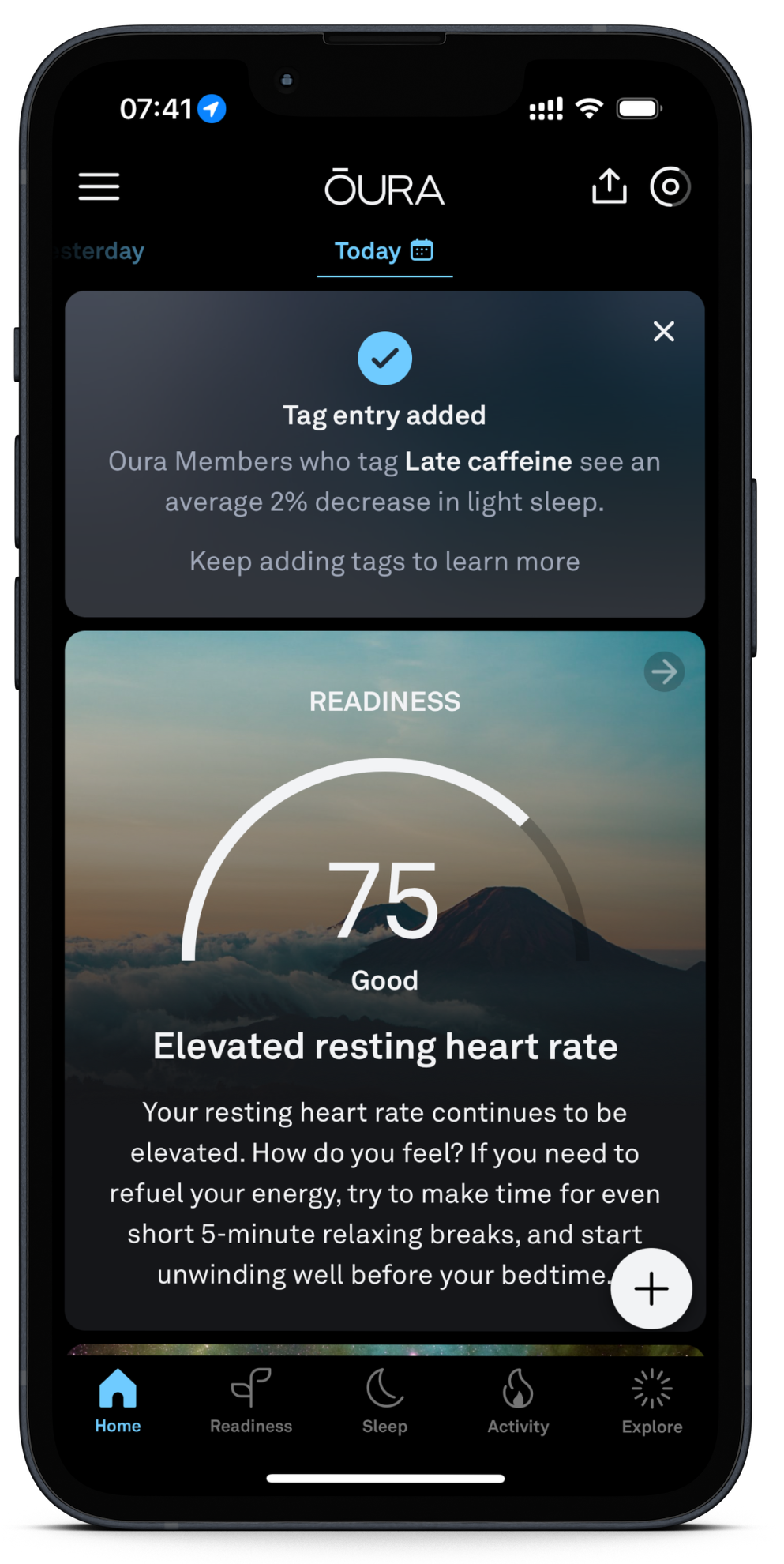If your morning brew is the only thing that gets you going in the morning, any advice that you should delay your morning caffeine may be the last thing you want to hear. While the concept of delaying caffeine has gained some traction on social media, the science is a bit more nuanced.
Here, we’ll delve into the research of timing your caffeine, and the best practices for you to enhance your performance and cognition.
How Caffeine Kick Starts Your Day
Caffeine is a natural stimulant found in coffee, tea, energy drinks, matcha, and even dark chocolate in small amounts. It’s earned its place as a morning must-have due to its ability to enhance alertness and combat drowsiness.
Here’s how: Levels of adenoise, a neurotransmitter, are lowest in the morning when you’re fully rested (or should be!). Adenosine builds up throughout the day, helping you feel sleepy in the evening. Caffeine helps you feel alert by blocking adenosine, preventing its sleep-inducing effects.
By blocking adenosine receptors, caffeine indirectly stimulates the release of other hormones and neurotransmitters like cortisol, dopamine, epinephrine (adrenaline), norepinephrine, and acetylcholine. This shift in your brain’s biochemistry results in heightened arousal—in other words, you feel ready to take on the day.
Reasons to Delay Caffeine
Online proponents advocate for delaying caffeine anywhere between 30 to 90 minutes after waking.
This advice usually centers around the cortisol awakening response (CAR). Much like adenosine, it’s secreted in a diurnal pattern aligned with circadian rhythm. This means that it peaks early in the morning, shortly after waking, and is lowest around midnight.
Consuming caffeine first thing in the morning spikes your already high cortisol levels. While you could argue this makes the best use of the morning cortisol peak, it can contribute to unpleasant side effects like jitters and anxiety.
Plus, when you build a tolerance to caffeine by having it every day, it can paradoxically lower your baseline cortisol levels. This is an indication of cortisol dysregulation, and might be responsible for your afternoon slump or why you need a triple shot just to wake up.
In theory, by delaying your caffeine an hour or so after waking, your cortisol levels naturally reach their peak and then drop, before coffee. This brings cortisol levels back up for a greater energy increase mid-morning.
Along the same lines, some people theorize that it may be effective to allow your adenosine levels (the “sleepy” neurotransmitter) to rise mid-morning, then combat it with caffeine.
READ MORE: How Caffeine Impacts Your Sleep
5 Signs That You May Want to Delay Morning Caffeine
 Wondering if this theory might work for you? See if any of these signs apply to you.
Wondering if this theory might work for you? See if any of these signs apply to you.
1. Coffee causes you stomach issues.
Coffee contains acid that can increase stomach acid production. If you drink it first thing in the morning on an empty stomach, it may irritate your stomach lining. This can potentially lead to gastrointestinal issues (i.e., running for the bathroom!) or worsen preexisting conditions such as IBS.
2. You feel jittery or anxious in the morning.
Caffeine heightens neural activity and spikes cortisol and adrenaline levels. If you’re prone to anxiety or under stress, consuming caffeine, which further activates your stress response, may not be a good idea. Delaying caffeine allows for your cortisol to naturally lower, rather than spiking it at its peak.
| Member Tip: Take a look at your Daytime Stress levels to see if your stress peaks after your morning brew. |
3. You depend on caffeine to feel awake.
Remember, you can build a tolerance to caffeine with high use. If you notice that you need a triple shot to feel alive, it could be time to delay or reduce your intake to help reset your body’s sensitivity to caffeine.
4. You’re struggling to sleep.
If you’re tossing and turning at night, it might be because there’s still caffeine in your system (yes, even if you just have one cup of coffee!). This is based on your own individual caffeine metabolism, affecting how long caffeine stays in your body.
READ MORE: Restless Sleep? How to Reduce Tossing and Turning at Night
5. You’re constantly tired or have an afternoon slump.
An afternoon energy slump might be because your early morning caffeine is interfering with your natural cortisol peak. Similarly, if you overdo the caffeine, it impacts your adrenal health. This can leave you with chronically low cortisol, manifesting as persistent tiredness.
READ MORE: Why Am I Tired in the Afternoon?
Reasons Not to Delay Caffeine
If this makes you want to cry in decaffeinated despair, don’t worry—you might not need to delay caffeine if it works well for you. Some reasons you might want to kick start your day with a cup of joe include the following scenarios:
1. You have an evening chronotype.
Some studies have shown that evening chronotypes (night owls) tend to have naturally lower levels of cortisol in the morning compared to morning chronotypes. So drinking coffee can be an effective way to wake up for early morning responsibilities.
| Member Tip: Discover your chronotype after 90 days of using Oura. |
2. You’ve been sleeping poorly.
In an ideal world, we’d all get seven to nine, high-quality hours of sleep per night. But that’s not always the reality. Having young children, working night shifts, sleeping next to a partner who snores, or other issues with your sleeping conditions may prevent you from getting a full night’s rest. This can lead to a need for caffeine in the morning to get going and get through the day. Don’t pressured to delay caffeine it if it’s an inescapable necessity during certain periods of life.
3. You have trouble concentrating.
Some preliminary studies have suggested that morning caffeine can be used as part of a treatment plan for people with attention deficit disorders like ADHD by increasing attention and focus.
4. You’re not very sensitive to caffeine.
There are varying degrees of caffeine sensitivity, which are largely genetic. Some people metabolize caffeine quickly and can drink greater quantities with smaller effects. This is For these people, it’s probably not necessary to delay your caffeine as the effects are more fleeting.
5. You’re a morning exerciser.
Studies show that caffeine can increase exercise performance and capacity. Translation: If you workout in the morning, a cup of coffee can actually improve your workout and give you the boost of motivation you need to get it done.
Who Should Cut Out Caffeine Completely?
If you’re experiencing caffeine dependency or withdrawals, it might be a good idea to consider cutting caffeine completely. Common symptoms include difficulty concentrating, fatigue, low energy, or irritability. Additionally, if you’re experiencing severe stress, anxiety, or gastrointestinal sensitivity, it might be a good idea to take a break. See a healthcare professional if you have any concerns with your caffeine reliance.
7 Ways to Optimize Your Caffeine Use and Timing
There are currently no studies that establish optimal caffeine timing, because of the variation humans have in their biology and lifestyles. That’s why it’s important to find what works for you by taking note of how your body responds.
These tips might help you establish a caffeine habit that works best for you.
- Consider eating breakfast first: A 2020 study suggested that eating breakfast before drinking coffee can help to reduce negative side effects like feeling jittery or having stomach problems.
- Use caffeine as a tool: To avoid dependency, try only consuming caffeine when you feel the need for it rather than reaching for it out of habit.
- Track your caffeine use on Oura: Tag “caffeine” on Oura when you consume caffeine to see how it impacts your sleep and stress levels. You may notice that your 3pm coffee actually delays your sleep onset.
- Align with your chronotype: Morning chronotypes may respond better to mid-morning caffeine, while evening chronotypes may benefit from caffeine upon waking.
- Listen to your body: Try to take note of how you feel after caffeine. Experiencing anxiety, shakiness, digestion sensitivities, or headaches are your body’s way of telling you to ease up. Switch to a lower-caffeine alternative, like matcha or tea.
- Avoid late-day caffeine: Even for the least sensitive caffeine drinkers, it’s still a good idea to avoid caffeine within 6 hours of bedtime. Caffeine has a half-life of 5 to 7 hours, which means it may still be in your system while you’re trying to drift off. In anonymized Oura data, members who tag “late caffeine” see an average 2% decrease in light sleep.
- Go cold turkey to reset your tolerance: And it doesn’t need to take too long. Some research indicates that going 2 to 9 days without caffeine might be enough to reset your caffeine sensitivity.












